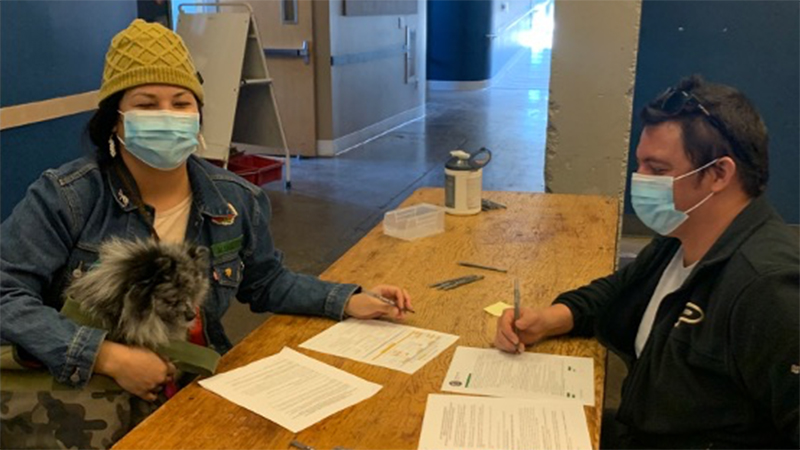May 12, 2021
Purdue center’s director works to expand COVID-19 vaccination options to Native American students
 Kylle Roy, with her dog, Mikoh, and Tawn Speetjens, a master’s student in the College of Agriculture, at a recent COVID-19 vaccination clinic sponsored by the Pokagon Band of Potawatomi. (Photo provided)
Kylle Roy, with her dog, Mikoh, and Tawn Speetjens, a master’s student in the College of Agriculture, at a recent COVID-19 vaccination clinic sponsored by the Pokagon Band of Potawatomi. (Photo provided)
What started as a conversation about getting more Native American and Indigenous people vaccinated against COVID-19 became reality, thanks to a Purdue University cultural center director.
Felica Ahasteen-Bryant, director of Purdue’s Native American Educational and Cultural Center and a commissioner on the Indiana Native American Indian Affairs Commission (INAIAC), had that conversation in early March with Scott Brewer, INAIAC chair, and Dr. Gerald Morris, medical director of the Pokagon Band of Potawatomi, with the idea of having a vaccination clinic in Indianapolis.
The Pokagon Band of Potawatomi’s Pokagon Health Services staff administered the Moderna vaccine on March 27 at the American Indian Center of Indiana. They provided the second dose on April 24.
The Pokagon Band of Potawatomi is a federally recognized tribe that also has an Indian Health Services clinic in Dowagiac, Michigan. According to Ahasteen-Bryant, more than a dozen Native American Purdue students have visited the clinic for their vaccinations, while up to seven went to Indianapolis. The clinic served up to 80 Native Americans.
“This demonstrates the strength of our Native American community,” Ahasteen-Bryant said. “It also showed that our students are very eager to get the vaccine.”
Kylle Roy, a first-year Ph.D. student in the College of Agriculture and a Native Hawaiian, traveled to Indianapolis to get her vaccine, as she is planning to return home soon.
“Being fully vaccinated will make traveling to Hawaii much easier, and I will also feel safer and protected with the vaccine,” Roy said.
Another reason to get vaccinated: students understand how COVID-19 has hit their families and tribal communities. Many tribal communities were among the first to have strict shutdowns and have worked to secure and to vaccinate community members.
“Seeing what happened in their tribal communities, I believe, made many of our students eager to get their vaccinations,” Ahasteen-Bryant said.
“Native Americans and Pacific Islanders have had really high COVID-19 numbers,” Roy said. “Pacific Islanders have been left out in general from priority vaccination, so it was so amazing that Felica and her colleagues were able to get this clinic together.
“I don’t think anyone should hesitate. Getting vaccinated is for the better good of everyone. It makes your work, school and home environment safer. If you’re looking for a way to help your community, just get vaccinated.”
Writer, media contact: Matthew Oates, 765-586-7496 (cell), oatesw@purdue.edu, @mo_oates;
Sources: Felica Ahasteen-Bryant, felica@purdue.edu
Kylle Roy

